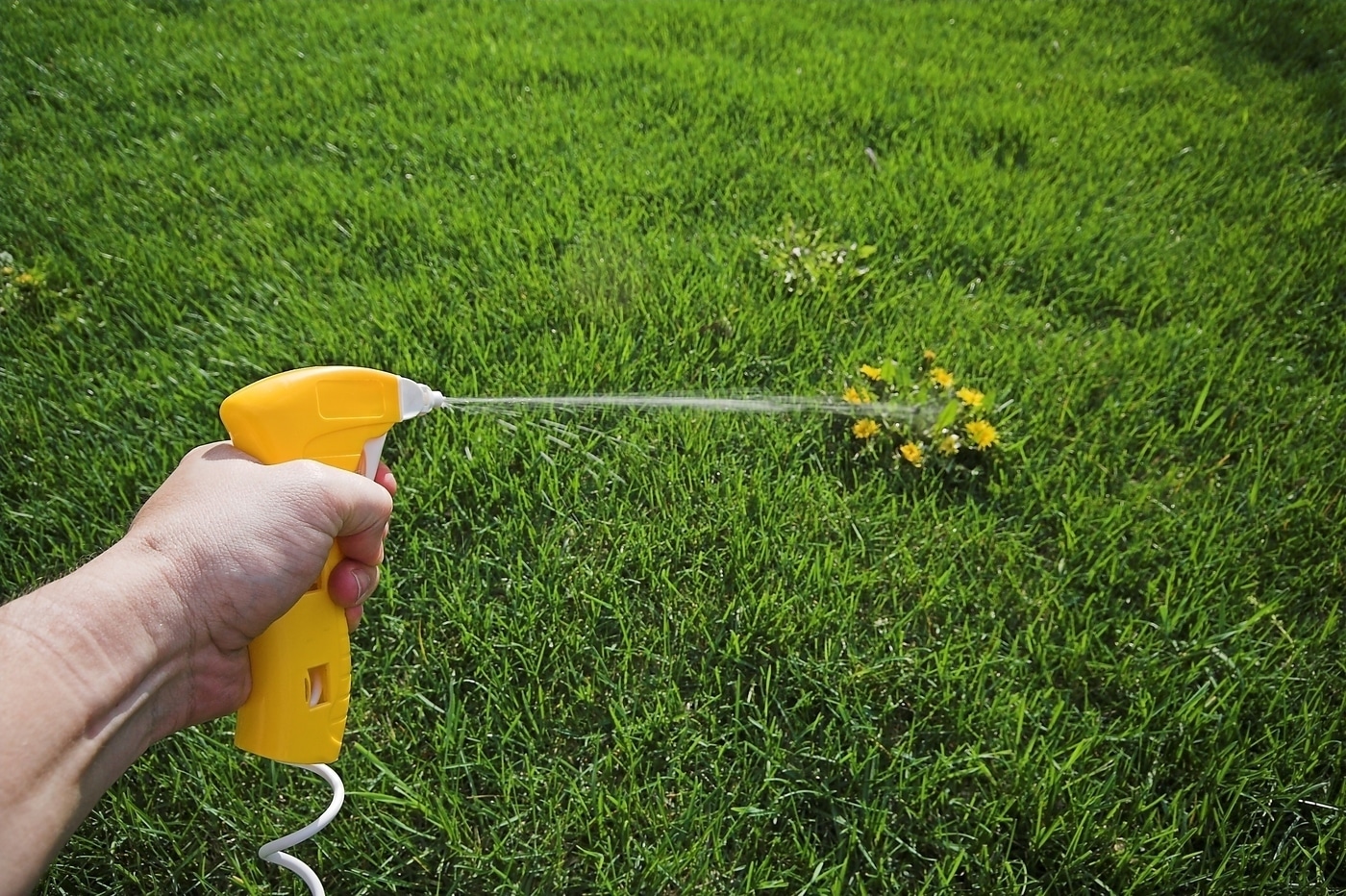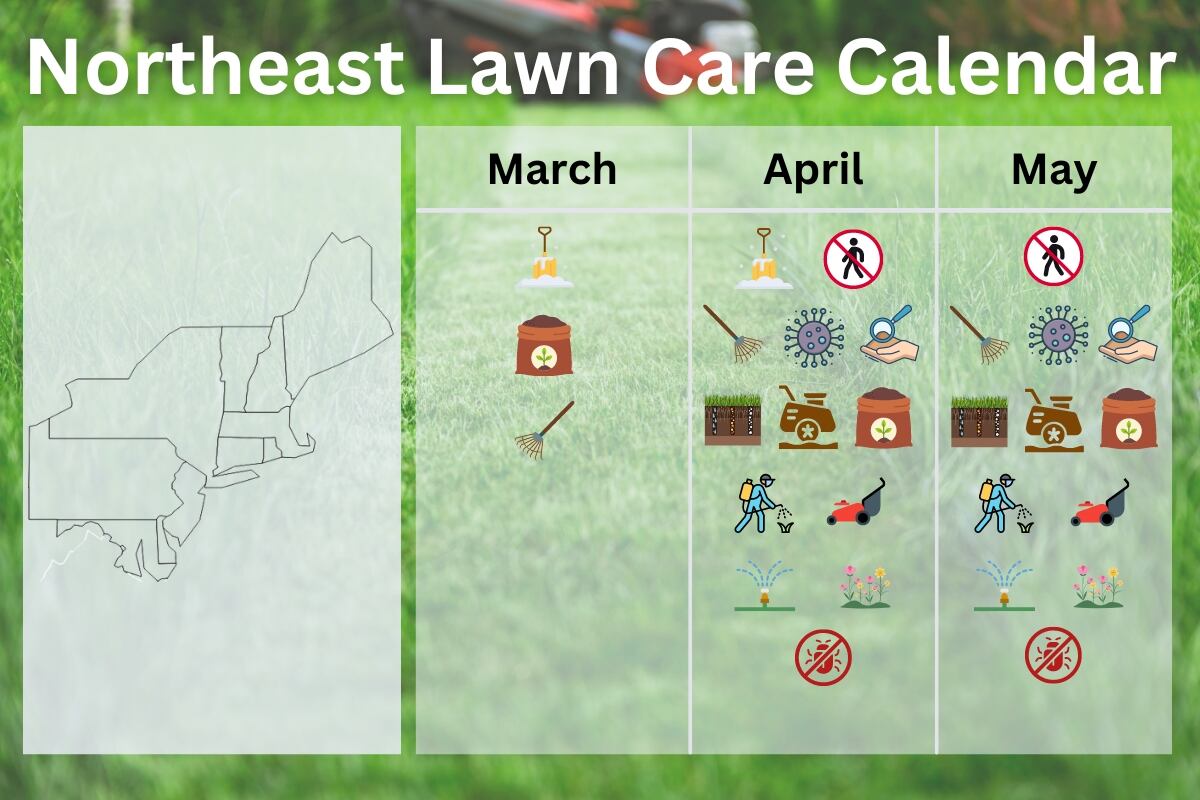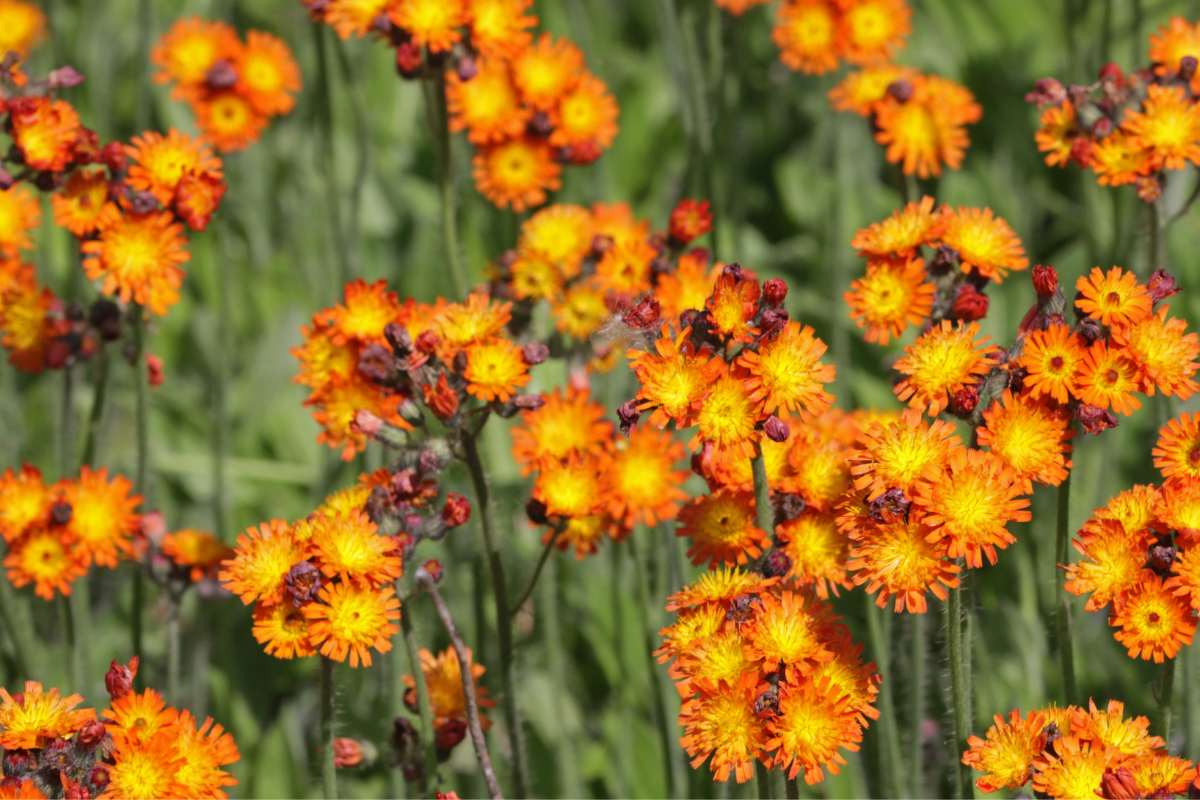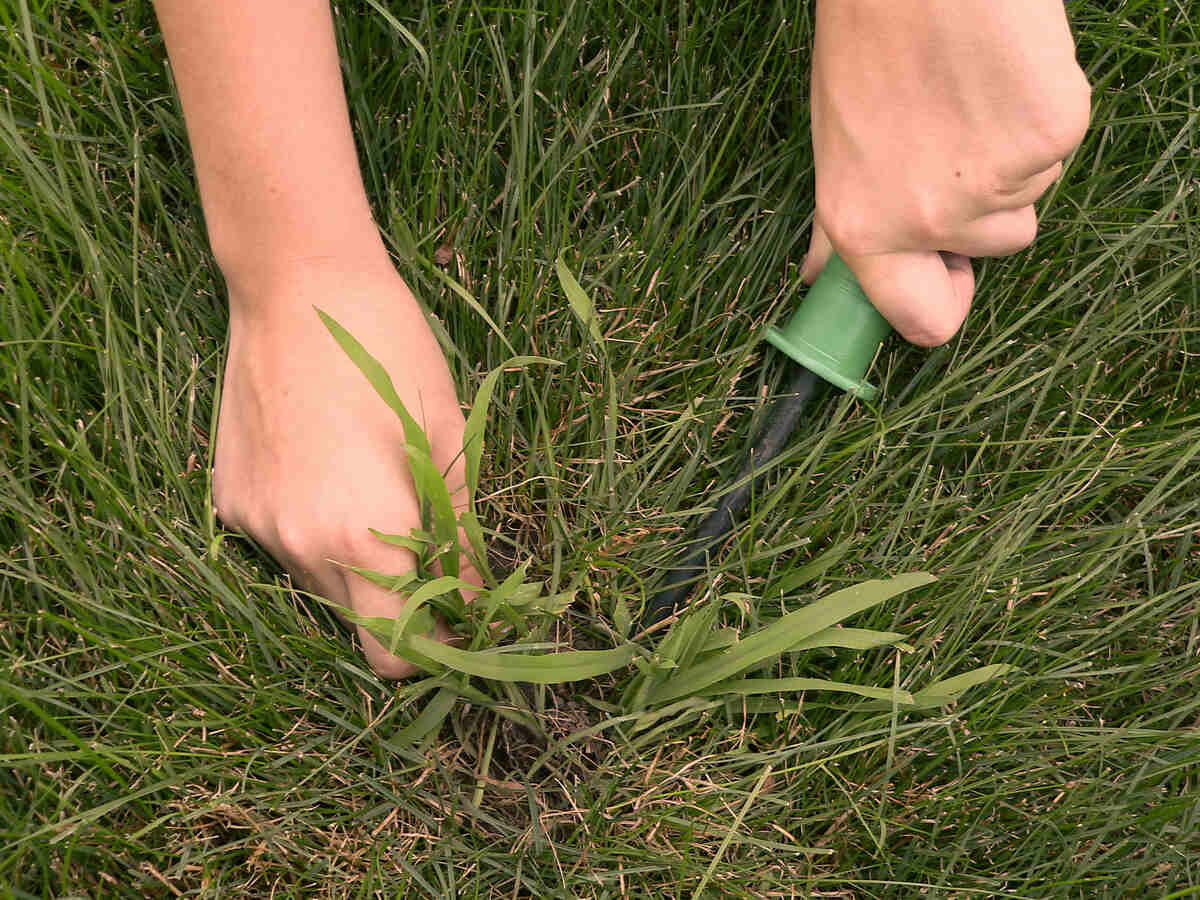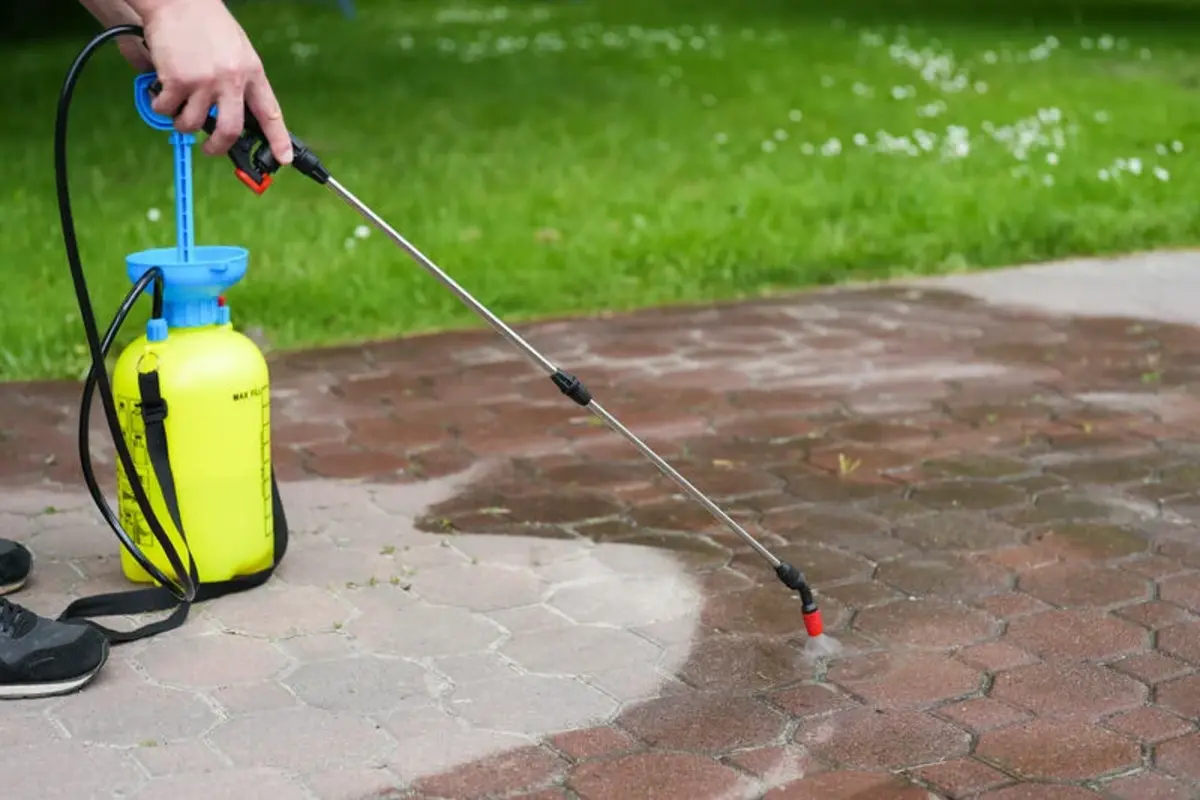
It may sound surprising, but it’s true — vinegar does kill weeds. Vinegar is a natural weed killer that works, but it will depend on the type of vinegar you use and how you apply it.
Even though science has proven that acetic acid (vinegar’s active ingredient) breaks down plant cells, the result differs for everyone. So, we’ll explain which types of vinegar work well and how you should use your vinegar weed killer to eliminate the weeds on your lawn.
How Vinegar Kills Weeds

Vinegar contains acetic acid, a contact herbicide that directly damages plant cells upon contact. The acid disrupts the cell walls, causing fluids to leak and eventually drying out (and killing) the plant.
However, not every vinegar has the same level of effectiveness when it comes to killing weeds. The rule is that the higher the concentration of acetic acid, the more effective it is as an organic herbicide.
For example, vinegar found in most kitchens has only about 5% acetic acid, so it’s not as effective as a vinegar weed killer spray containing a higher concentration of acetic acid.
Here are the different concentrations of acetic acid used for residential weed control:
| Type of Vinegar/Acetic Acid Content | Effect on Weeds |
| Household vinegar (5%) | Least effective; kills young weeds within the first 2 weeks after they emerge from the soil. |
| Horticultural vinegar (10% to 20%) | More effective; commonly sold as a natural herbicide. |
Note: Industrial-strength vinegar containing 20% to 30% acetic acid (or higher) is very effective at killing even mature weeds. But it’s mostly used in agriculture since it can be extremely dangerous to use around the house. While you can dilute it, a better solution would be to call a lawn treatment pro who can control the weeds in your lawn safely and effectively.
See Related: How Much Does Weed Control Cost?
Types of Vinegar to Kill Weeds
Top Garden-Strength Vinegar Products
| Image | Title | Rating | |
 | Alliance Chemical 10% Vinegar | ⭐⭐⭐⭐⭐ | Check Pricing |
 | Cleanaroo 20% Concentration Vinegar | ⭐⭐⭐⭐⭐ | Check Pricing |
 | MAXTITE High-Strength 20% Vinegar for Home & Garden | ⭐⭐⭐⭐⭐ | Check Pricing |
 | Green Gobbler 20% Vinegar Weed & Grass Killer | ⭐⭐⭐⭐ | Check Pricing |
If you’re dealing with a diverse range of weed species, non-selective post-emergent herbicides like vinegar are the best choice. This type of herbicide will harm everything it comes into contact with, including turfgrass, flowers, and other plants (so be careful when you spray).
You can use these types of vinegar to kill weeds on your lawn:
Household Vinegar
Household vinegar usually contains 5% acetic acid. To get the most out of household vinegar, you should use it only on young weeds, especially annual weeds with shallow roots.
For example, this weak acid can get rid of young dandelions. But it won’t be able to kill established dandelions with strong roots.
Other young weeds that can be killed with household vinegar include:
- Common chickweed
- Mallow
- Crabgrass
- Spurge
See Related: Read Your Weeds: Identify Them to Learn About Your Lawn’s Health
Horticultural Vinegar
Typically containing 10% to 20% acetic acid, horticultural vinegar is more effective than household vinegar for controlling weeds in lawns.
Examples of weeds that horticultural vinegar can eliminate:
- Clover
- Creeping Charlie
- Mustard weed
- Pigweed
- Purslane
Note: Using vinegar on perennial weeds can be challenging. Since the acid doesn’t translocate to the root system, weeds like dandelions (mature), horsetail, and Canada thistle can still regrow. Other ways to get rid of weeds in grass include applying systemic post-emergent herbicides, pulling them out by hand (or with a weed puller), and mowing to prevent seed heads.
Safety Tip: Concentrated vinegar high in acetic acid can burn your skin and eyes, even causing permanent eye injury. So, don’t forget to wear safety gloves, goggles, and other personal protective equipment listed on the label.
See Related: 8 Best Post-Emergent Herbicides [Reviews]
Vinegar Weed Killer Recipe
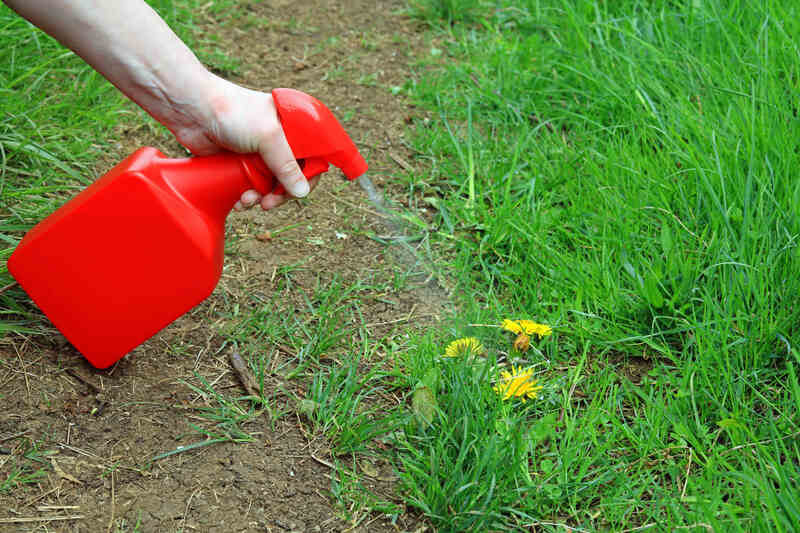
Spraying vinegar directly is well and good in itself. But if you want it to be more effective, you need to mix in other ingredients, such as:
- Dish soap: Helps the acetic acid penetrate the weed by breaking down the plant cuticle.
- Salt: It can also burn weed leaves by sucking out moisture, adding to the already dehydrating effect of vinegar. But remember to add salt sparingly, as it can make the soil infertile.
- Baking soda: With salt as one of its major ingredients, baking soda acts the same way as salt in dehydrating plants it comes into contact with.
- Lemon juice: The citric acid in lemon can enhance the acetic acid’s ability to kill weeds.
Depending on the strength of the vinegar and the type of weeds, the ratio of vinegar to water can range from 1:1 to 4:1.
If you’re using 5% vinegar, you can mix the following ingredients to make your homemade weed killer:
- 1 gallon of vinegar
- 1 cup of salt (optional, see Note)
- 1 tablespoon of dish soap
Note: Salt is optional and can be replaced with baking soda or lemon juice.
If your vinegar contains 10% to 20% acetic acid, you can spray it directly onto your target weeds.
Best Practices to Use Vinegar to Kill Weeds
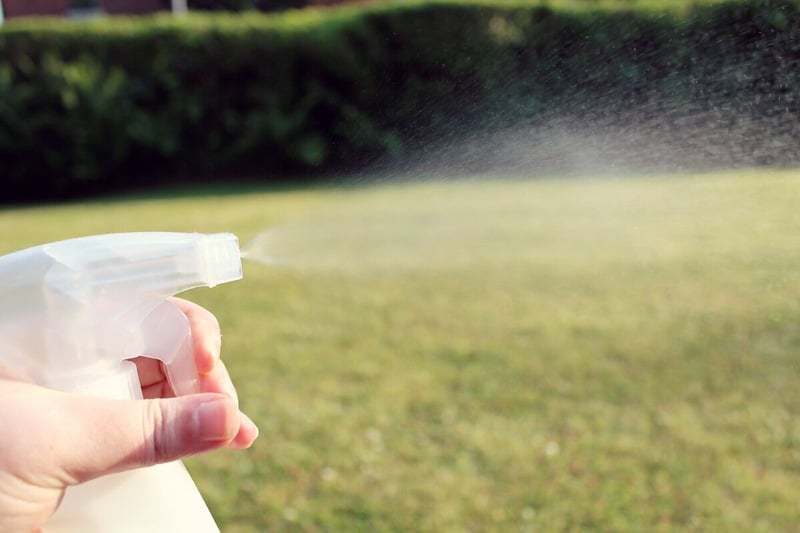
If you want to have good results when using your vinegar weed killer spray, here are some best practices you can follow:
- Apply on a sunny, dry day: You want your vinegar solution to stick to the weeds and not get washed away, so it’s best to do it when there’s plenty of sunlight and dry weather. If it rains, wait 24 to 48 hours before applying your vinegar weed killer.
- Mix with dish soap: Whether you’re planning to just use plain vinegar or add baking soda or salt, it’s always best to add a few drops of dish soap to make the vinegar stick to the leaves.
- Use great care when applying: Vinegar is non-selective and can harm surrounding plants. Whether you’re using a spray bottle or brush, target only the weeds and don’t let the solution get onto your desirable plants. For added protection, you can use plastic sheeting or cardboard to shield nearby plants.
- Don’t apply near metals: Since vinegar can stain or damage metals like aluminum and iron, avoid applying it near metal fences or furniture.
- Go with stronger vinegar for tough weeds: Use the right vinegar based on the weeds you’re targeting. Tougher and deep-rooted weeds may require stronger acetic acid concentrations found in horticultural vinegars.
- Reapply as needed: For stubborn weeds, you might need to reapply the solution several times. Check the treated areas after a few days to see if they require multiple treatments. But you should only apply vinegar once every 2 weeks.
Note: Since vinegar is naturally acidic, you might be worried that it will disrupt your soil’s pH. But if you’re only using your vinegar weed killer spray once every 2 weeks, you can put those worries away, as your soil’s pH will not be impacted. Vinegar breaks down quickly, so it’s not likely to accumulate in the soil.
See Related:
FAQ About Vinegar Weed Killers
It takes around 24 hours for vinegar to kill weeds. However, tougher or more mature weeds may require multiple applications. If you’re using vinegar with a lower concentration of acetic acid, it could take up to 2 weeks before the weeds are killed.
Yes, vinegar will kill your grass as well. Vinegar is considered a contact and non-selective organic herbicide, which means it can harm any plants it comes into contact with. So, it’s important to use extreme caution when spraying or applying a vinegar weed killer.
While you can’t mix vinegar with other chemicals, you can mix it with natural weed killers like salt and baking soda, but this should be done carefully. While it may increase the efficacy of the weed killer by boosting its adhesion and dehydration, too much can cause additional harm, such as making the soil infertile.
Control Weeds Naturally in Your Lawn
While this natural weed killer can yield quick wins in your war against weeds, it will not eradicate them entirely. Plus, the strong odor of vinegar may turn you off. For a more comprehensive weed management and lawn care solution, it’s always best to consult a local lawn treatment pro.
If you’d prefer to stay chemical-free, regular mowing and overseeding also go a long way in growing a thick lawn to outcompete weeds, all while keeping the lawn safe for people and pets.
Sources:
- “Acetic Acid.” Virginia Department of Health.
- “Does Vinegar Help with Controlling Weeds?” Oregon State University Extension.
- “Does Vinegar Kill Weeds?” By Noelle Orloff, extension associate specialist. Montana State University.
- “Spray Weeds With Vinegar?” By Don Comis, public affairs specialist. United States Department of Agriculture.
- “Vinegar: An Alternative to Glyphosate?” By Deborah Smith-Fiola, independent IPM consultant, and Stanton Gill, IPM specialist. University of Maryland Extension.
LawnStarter participates in the Amazon Services LLC Associates Program. LawnStarter may earn revenue from products promoted in this article.
Main Image Credit: Trineso / Adobe Stock

